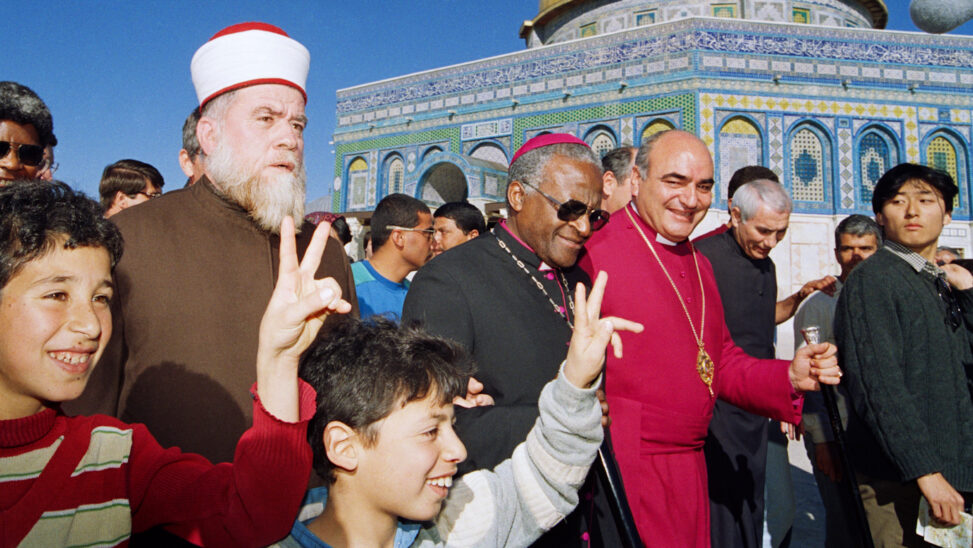Rewriting history – essentially negating the historical relations between the anti-apartheid struggle in South Africa and the ongoing struggle to free Palestine – serves the interests of mainstream Western media and their acolytes.
On January 1, 2022 – as South Africa buried one of its most illustrious sons and anti-apartheid icons, Archbishop Desmond Tutu – the hypocrisy of the corporate media was on full display. Reuters described him as “Africa’s ‘moral compass’”. Al Jazeera referred to him as “South Africa’s anti-apartheid icon.” CNN published articles referring to him as the “voice of justice and South Africa’s national conscience”. South Africa’s largest media outlet, SABC (South African Broadcasting Corporation) took the cake with an article titled: “Dalai Lama’s representative at Tutu’s funeral urges the world to think about China-Dalai Lama issue”.
While corporate media outlets literally trampled each other while competing to give the most glowing tribute to Archbishop Desmond Tutu, they all shamelessly omitted his public and unwavering support to the people of Palestine and their daily struggle against the grip of Israeli occupation. Anyone with basic knowledge about the history of the Bishop would have expected his solidarity with Palestine to feature in any report on his life. There is simply no journalist or historian, worth their salt, who can talk about the Bishop and fail to mention his energetic and almost lifelong support of the Palestinian cause.
Desmond Tutu’s views and opinions on the Palestinian question are well documented; journalists do not need to dig too deep to find them. In an editorial published by the Israeli newspaper Haaretz in 2014, he pointed out the many parallels between the Israeli occupation and the apartheid government of South Africa, writing:
I have been to the Occupied Palestinian territory, and I have witnessed the racially segregated roads and housing that reminded me so much of the conditions we experienced in South Africa under the racist system of Apartheid.”
A year earlier, the Bishop placed emphasis upon this comparison in an interview with The Washington Post, reminding readers that “What’s being done to the Palestinians at checkpoints, for us, it’s the kind of thing we experienced in South Africa.”
Desmond Tutu was also a staunch supporter of the BDS (Boycott, Divestment, and Sanctions) movement, for doing business with Israeli occupiers, he believed, dangerously perpetuated the status quo. In the Haaretz article, he pointed out:
Those who continue to do business with Israel, who contribute to a sense of “normalcy” in Israeli society, are doing the people of Israel and Palestine a disservice. They are contributing to the perpetuation of a profoundly unjust status quo.”
At first glance, one would get the impression that the failure by mainstream media to mention this important fact about Bishop Tutu was possibly the result of excessive drinking during the festive period. While intoxicating beverages may have played a role in this slight of facts, such an omission is by design, courtesy of the South African and international media. Rewriting history – essentially negating the historical relations between the anti-apartheid struggle in South Africa and the ongoing struggle to free Palestine – serves the interests of mainstream Western media and their acolytes.
Conveniently selective editing
The African National Congress (ANC) and its leaders have a profound and long-standing relationship with the people of Palestine. It has been cemented by the shared experience of being subjected to brutal and murderous regimes in their respective countries. Made uncomfortable by this solidarity, the Israel lobby has spared no efforts to diminish, discredit or erase this relationship from public view. To achieve their objective, they now target mainstream consumers of corporate media, the so-called drivers of public opinion. Far too many editors have fallen for these schemes, rendering themselves butchers of the truth and facts.
Distorting history – African history, in particular – does not start with Bishop Tutu. From the continent and beyond, we also witness how Nelson Mandela’s legacy is scrambled and nullified. How many corporate media editors would fight for front-row seats at the unveiling of a statue in Madiba’s honor but not whisper a single word regarding his criticism of Israel’s apartheid policies and love and admiration for the Cuban Revolution?
While The New York Times said Mandela’s voice helped slay apartheid, and the BBC noted the “Nobel Peace Prize winner who helped end the racist regime in South Africa,” they all skipped the question of Palestine. How convenient.
Unwilling to offer a complete and coherent version of history and global icons such as Bishop Tutu, the mainstream instead provides viewers a photo-shopped edition. No amount of doctoring, however, can erase the brave and morally upright stance that the Bishop took on the Palestinian question. The best way we can honor his memory and legacy is to follow in his principled support of the sons and daughters of Palestine who aspire for freedom.
To Bishop Tutu, I say, “Hamba Kahle Mkhonto!” (You lit the torch of resistance and we shall follow in your footsteps!)
Feature photo | Desmond Tutu, center, accompanied by Deputy Mufti of Jerusalem Muhammad Saeed Jamal, right, and head of the Anglican Church in Israel, Bishop Samir Kafity (on Tutu’s left) walk past the Dome of the Rock mosque on Jerusalem’s Temple Mount, Dec. 23, 1989. Anat Givon | AP
Clinton Nzala is a Political Strategist and Analyst based in Quito, Ecuador. He works for Pan-Latin American news outlet, teleSUR. He has worked with various political and social movements across Africa as a mobilizer and organizer.
Source: MintPress News
